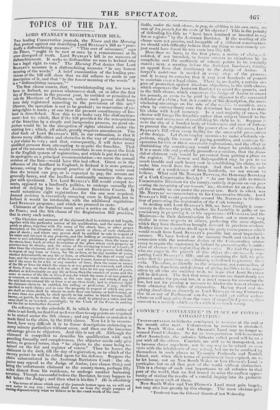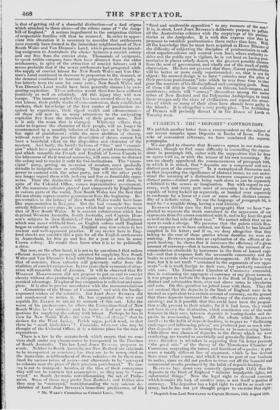CONVICT " CONVEYANCE" IN P f...NCE OF CONVICT COLONIZATION.*
TRANSPORTATION as hitherto conducted is to cease at the end of the month after nest. Colonization by convicts is abolished. New South Wales and Van Diemen's Land may no longer be termed Penal Colonies. So far as transportation will hencetbrth affect Australasia, the colonies hitherto called penal will be on a par with all the others. Convicts are still to be transported, not to become slaves anywhere, nor in any way to he mixed as con- victs with the inhabitants of any colony, but are to be confined by themselves in such places as Tasman's Peninsula and Norfolk Island, and, when their terms of punishment have expired, are to be let loose, not on New South Wales or Van Diemen's Land 1:1 particular, but on all that part of the world without distinction. This is a change of such vast importance to all colonies in that part of the world, that we feel bound to seize the earliest oppor- tunity of stating the results of a careful inquiry into its probable operation upon each of them. New South Wales and Vat) Diemen's Land must gain largely, but may also lose greatly by this change. The most obvious gain * Tra8ferred from the alonial Gazette of last Wednesday.
is that of getting rid of a shameful distinction—of a foul stigma which attached to them alone—of the odious name of " the dung- hill of England." A serious impediment to the emigration thither of respectable families will thus be removed. In order to appre- ciate this alteration it is necessary to consider that settlements have recently been formed in the immediate neighbourhood of New South Wales and Van I)iemen's Land, which presented to intend- ing emigrants to Australasia the choice between a convict colony and one free from the convict stain. Thousands of emigrants, to speak within compass, have thus been diverted from the older settlements, in spite of the attraction of convict labour; and it seems probable that if the newer settlements had prospered while the supply of convict labour for New South Wales and Van Die- men's Land continued to decrease in proportion to the demand, or the demand continued to increase in proportion to the supply, as has latterly been the case for some years, New South Wales and Van Dienten's Land would have been generally shunned by emi- grating capitalists. Those colonies would therefore have suffered positively as well as relatively. All this injury they will now escape. The immense capital that has been created there by con- vict labour, their public woiks of communication, their established markets, their knowledge of the best modes of production ac- quired by experience, their sigual wealth and advancement— all these will now be so many attractions to the emigrating capitalist free from the drawback of their penal name. Nor is it only the name that is changed. Whatever efforts they make to improve the character of their people, will no longer be counteracted by a monthly infusion of fresh vice or by the fami- liar sight of punishment ; while the mere abolition of shivery, without regard to the peculiar description of slaves, cannot but have a beneficial effect on the disposition and character of the masters. And lastly, the hostile factions of " face " and " emanci- pist" which have groan out of the system of penal transportation, and which resemble the French and English of Lower Canada in the bitterness of their mutual animosity, will soon cease to distract the colony and to render it unfit for free institutions. The " engin- cipist" party, getting no accession of number, must gradually dwindle to insignificance or nothing. They will neither have the power to contend with the other party, nor will the other party any longer regard them with jealousy and fear as formidable oppo- nents. Thus the distinction will soon disappear : and then, in spite of the Colonial Office, conies representative government.
Of the numerous colonies phoard (not conquered) by Englishmen
in various parts of the world, New South Wales was the first that did not obtain representative government from the beginning. Re- presentation in the infancy of New South Wales would have been like representation in Newante. But the bad example. has been strictly followed ever since, in cases which had no resemblance to that of New South Wales. It is convict colonization which has
deprived Western Australia, South Australia, and Captain Hon- son's subjects in New Zealand, of that birthright of Englishmen
which was never withheld float an English colony until England 'regalia° colonize with convicts. England may now return to her ancient and welt-approved practice. If any render here in Eng- land should not consider this a gain for all the English settlements in Australasia, let him go and live for a year or two in some Crown colony. 1Ie would then know what it is to be politically a slave.
But now, on the other hand, it is not to be questioned that unless efficient measures be promptly adopted for supplying New South Wales and Van Diemen's Land with free labour as a substitute for that of convicts, those colonies will grievously suffer from the abolition of convict emigration. In two years their economical situa-
ation will resemble that of Jamaica. It will be observed that Sir WILLIAM Moi.aswoaan did not propose to put an end to convict slavery without also producing an adequate substitute far that eco- nomical advantage. his plan of free emigration is sufficient and com- plete. It is also in precise accordance with the recommendations o iConunittee of the House of Commons,* and with the loudly- expressed wishes of' the colonists. Ent Lord Jona Russian did not condescend to notice it. lie has appointed the wise and capable Mr. Eaanar to attend to matters of this sort. Like the worst of his predecessors, he allows the Emigration-find of New South 'Wales to be robbed ; and lie turns a deaf ear to all sug- gestions for supplying the colony with labour. Perhaps he has in
view for New South Wales the same " blca t.11:1:gc" that he desires for the West Indies. Perish sugar, perish wool, so that there be " small freeholders" ! Certainly, whatever else may be thought of the Colonial Office, it is a famous place for the ruin of reputations.
There is a law in the statute-book which enacts that no con- victs shall under any circumstance be transported to the Province of South Australia. This law Lord Jou N Russma. proposes to evade. Neither to South Australia nor New Zeabuid are criminals to be transported as convicts ; but they arc to be transaarted to the immediate neighbourhood of those colonies—to be there con- fined for various terms of years—and afterwards to be "conveyed to colonies near the place of their previous puniahment." To con- yea is not to transport : besides, at the time of their convey:nice they will not be convicts but emancipists : SO they may be " con- veyed " to South Australia notwithstanding the act of Parlia- ment. Some of them ma v prefer New Zealand ; and thither also they may be "conveyed,4 notwithstanding the very solemn de- claration of Lord JOHN Russima's immediate predecessor, of his • Mr. WARD'S Committee on Colonial Lands, 1836. " fixed and unalterable opposition" to any measure of the grata It is, in short, Lord JOHN RUSSELL'S deliberate. purpose to pollute all the Australasian colonies with the em ptymgs of his peniten- tiaries at the Antipodes. It is with this express view that he proposes to establish penitentiaries there rather than here. With all the knowledge that he must have acquired as home Minister of the difficulty of subjecting the discipline of penitentiaries to suffi. cient superintendence and control even here, where authority re. sides and the public eye is vigilant, he is yet bent on having peni- tentiaries in places utterly desert, at the greatest possible distance from the scat of government, and wholly out of the reach of public observation. He does not pretend that these distant penitentiaries will be better or more easily superintended : no, that is not his object : his avowed design is to have " colonies near the place of their previous punishment," into which he may from time to time pour the contents of his ill-disciplined and corrupting- gaols. Some of them will stay in those colonies as thieves, bush-rangers, and murderers ; others will " convey" themselves among the native tribes of New Zealand and the Polynesian Archipelago, to teach those savages only the vices of civilization, and repeat the atroci- ties of which so many of their class have already been guilty is the islands. It is altogether a very pretty plan. The Archbishop of Deimos will probably dissect it in the House of Lords on Tuesday next.



























 Previous page
Previous page